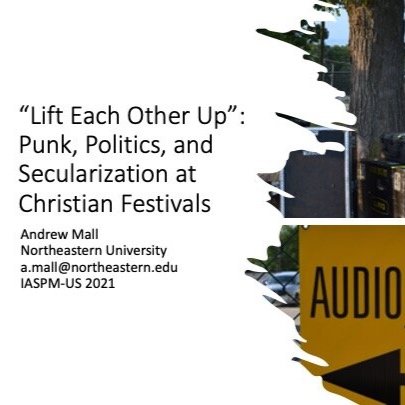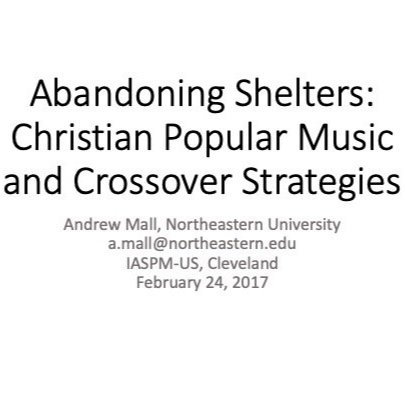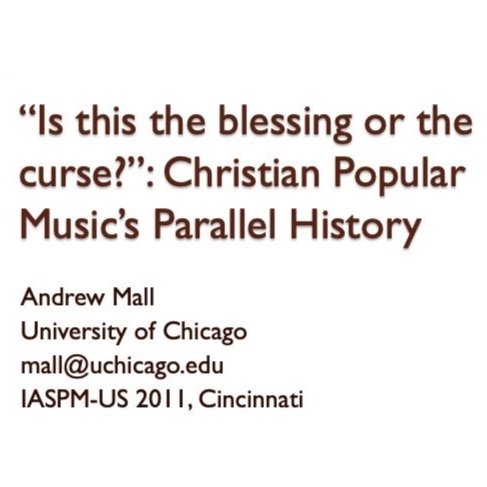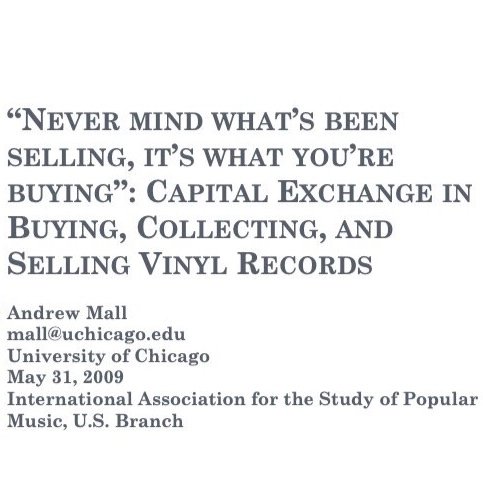Hardcore Community at Furnace Fest
IASPM-US conference panel (2024). In 2023, our six-member team was on site in Birmingham, Alabama for five days, building upon over two years of prior research in 2021 and 2022. In this panel, four fieldwork team members share their findings along distinct themes. Together, we explore the ways in which community is substantiated and maintained at Furnace Fest.

Recent Books on Christian Music
Popular Music Books in Process roundtable presentation (2021). Nathan Myrick, Marcell Silva Steuernagel, and myself discussed our recent books in conversation with each other as part of the PMBiP series of author talks, co-sponsored by IASPM-US, JPMS, and the Popcon.

“Lift Each Other Up”: Punk, Politics, and Secularization at Christian Festivals
IASPM-US conference presentation (2021). When the members of Flatfoot 56, a Celtic punk band from Chicago, speak of “brotherhood” at AudioFeed, a Christian music festival, they refer to congregational cohesion; at a secular punk venue, however, scene unity is just as likely an interpretation. Whereas Christian punks sacralize secular places, such as the bars and nightclubs where they often perform, this paper suggests that bands like Flatfoot 56 might be thought to secularize sacred places (i.e., Christian festivals) by decentering U.S. evangelicalism’s most controversial public positions. Through an ethnographic analysis of Flatfoot 56 performances, considering what is sung/spoken aloud and what is not, this paper argues for a nuanced, mediating perspective that recognizes an ambivalence about identity politics among many evangelical subculturalists moving between secular and sacred spaces.

“As for me and my house”: Nashville, the Home of Christian Music
IASPM-US roundtable (2018). For this roundtable, current and former Christian music professionals who have worked in A&R, executive leadership, higher education, music ministry, publishing, and radio promotions, among other roles, address the unique challenges that face Christian music. With many combined decades of experience in organizations large and small, our panelists are well-attuned to the city’s centeredness to the Christian music industries. We consider how Christian music has impacted Nashville, address the difficulties of maintaining a profitable business while conducting a ministry, and consider the boundaries of Christian music—increasingly porous as they are—in the broader contexts of globalized entertainment.

Abandoning Shelters: Christian Popular Music and Crossover Strategies
IASPM-US conference presentation (2017). In this paper, I critically analyze the strategies of two crossover cases: Amy Grant, who became the first Christian pop singer with a number-one Billboard Hot 100 single following the 1991 release of “Baby, Baby,” and Tooth and Nail Records, a Christian metal and punk label whose artists straddle multiple margins, crossing over from one to another. In doing so, I build upon the works of Hebdige, Toynbee, Weisbard, and others to theorize crossover as a process through which niche markets change over time.

“Is This the Blessing or the Curse?” Christian Popular Music’s Parallel History
IASPM-US conference presentation (2011). In this paper, I examine the historical forces that shaped the CCM industry as separate and distinct from the mainstream industry, and consider how these forces have also contributed to the relative absence of scholarship on Christian popular music within popular music studies’ canons. I rely primarily on historical and ethnographic research on the Christian popular music recording industry undertaken for my dissertation in 2009–2010.

“Never Mind What’s Been Selling, It’s What You’re Buying”: Capital Exchange in Buying, Collecting, and Selling Vinyl Records
IASPM-US conference presentation (2009). Who holds the upper hand at record fairs? The dealers sell the commodities, yes, but the collectors decide what to buy, from whom, and (often, via bargaining) for what price. While dealers frequently self-identify as collectors, interactions between dealers and collectors necessarily rely upon the commodity status of music recordings and their role in the exchange of economic, cultural, and social capital. Through ethnographic research at Chicago-area record fairs, I explore the tensions between record dealers and record collectors, and investigate the ways in which capital and exchange contribute to musical meaning.
Search and navigate extras
- music industries
- festivals
- gamelan
- Boston
- God Rock Inc
- CCM
- Northeastern University
- Christian rock
- panels
- Tufts University
- worship
- congregational music
- Northeastern Global News
- SCM
- record labels
- Nashville
- methods
- ethics
- Chicago
- University of Chicago
- punk
- SEM
- radio
- Taylor Swift
- subculture
- capital
- Furnace Fest
- AMS
- TikTok
- IASPM-US
- hardcore
- sing-alongs
- Amy Grant
- crossover
- introductions
- emo
- vinyl
- TIME
- scene
- AAR
- Beer & Hymns
- MEIEA
- Christianity Today
- DePaul University
- Universal Music Group
- awards
- Future of Pop
- community
- Keith Green
- Ticketmaster